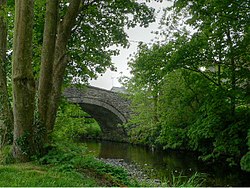Pontrhydfendigaid
| Pontrhydfendigaid | |
| Cardiganshire | |
|---|---|
 The Old Bridge at Pontrhydfendigaid | |
| Location | |
| Grid reference: | SN730666 |
| Location: | 52°16’56"N, 3°51’46"W |
| Data | |
| Post town: | Ystrad Meurig |
| Postcode: | SY25 |
| Dialling code: | 01974 |
| Local Government | |
| Council: | Ceredigion |
| Parliamentary constituency: |
Ceredigion |
Pontrhydfendigaid is a village in Cardiganshire, on the western flank of the Cambrian Mountains, between Devil's Bridge and Tregaron. The village lies on the River Teifi, the source of which is just three miles to east at Llyn Teifi.[1]
It is known for the ruins of the Cistercian Strata Florida Abbey, founded 1164, where Dafydd ap Gwilym is said to be buried and Llywelyn the Great held a council.
The village is home to an annual eisteddfod and a Celtic Music Society is based at the village's Black Lion Hotel.
Pontrhydfendigaid in Fiction
In the novel The Discovery of Heaven by Dutch author Harry Mulisch, the village is the place where the characters Mr and Mrs Spiers spend their holidays.
The Beast of Bont
The Beast of Bont is the name given to a big cat said to roam the area, Pontrhydfendigaid being at its centre (Bont being the local abbreviation/colloquial name for Pontrhydfendigaid). It was blamed for the death of 12 sheep in June 1981. After a number of livestock attacks in the mid-1990s, Ministry of Agriculture veterinarians inspected a sheep carcass "and declared that the killer was a great deal more powerful than a fox or dog".[2][3] The Dyfed-Powys police then searched the area, but failed to find the animal.
In the spring of 2012, Mark Davey and his partner Annette came across a "sickening" scene: two large groups of slaughtered sheep, about two miles apart, in the hills near Devil's Bridge. In a statement to local newspapers, he reported "that something had quite clearly attacked them because they looked like they had been ripped apart" and that "to kill so many sheep in such a small area it had to be quite a strong animal".[4]
References
- ↑ Walesdirectory.co.uk - Pontrhydfendigaid
- ↑ Sheldrick, Giles (16 May 2012). "20 Sheep Found Butchered by 'Beast of Bont". The Daily Express. http://www.express.co.uk/news/uk/320416/20-sheep-found-butchered-by-Beast-of-Bont. Retrieved 21 February 2013.
- ↑ Furness, Hannah (15 May 2012). "'Beast of Bont' Returns as 20 Sheep Found Massacred". The Telegraph. http://www.telegraph.co.uk/earth/earthnews/9267032/Beast-of-Bont-returns-as-20-sheep-found-massacred.html. Retrieved 21 February 2013.
- ↑ Morgan, Sion (11 May 2012). "Video: Is this the clearest evidence yet that a big cat is roaming Welsh hills?". http://www.walesonline.co.uk. http://www.walesonline.co.uk/news/need-to-read/2012/05/11/video-is-this-the-clearest-evidence-yet-that-a-big-cat-is-roaming-welsh-hills-91466-30949549/. Retrieved 21 February 2013.
Outside links
- Pontrhydfendigaid Community website
- Strata Florida Abbey
- BBC article about the Celtic Music Society
- www.geograph.co.uk : photos of Pontrhydfendigaid and surrounding area
This Cardiganshire article is a stub: help to improve Wikishire by building it up.